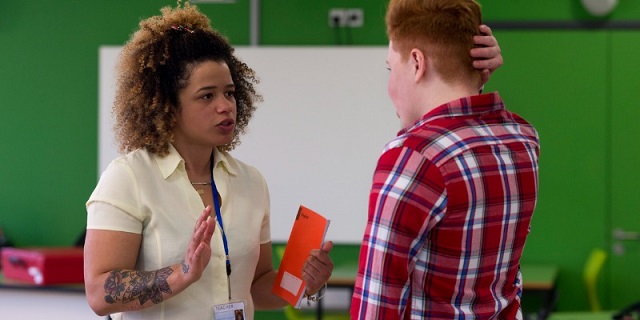Education
School board trustees should embrace genuine diversity and avoid unnecessary legal fights

From the Fraser Institute
Too many Canadian school boards are getting sidetracked by unnecessary legal battles rather than focusing on educating students.
Case in point, Carolyn Burjoski, a former teacher in the Waterloo Region District School Board (WRDSB), recently won a decisive legal victory when Justice James Ramsay rejected WRDSB’s attempt to quash Burjoski’s defamation lawsuit and awarded her $30,000 in legal fees.
Burjoski had sued her former employer because the board chair publicly accused her of transphobic behaviour for raising concerns during a board meeting about the sexualized content in a number of school library books. His public attacks on Burjoski exposed the school board to a defamation lawsuit.
In his decision, Justice Ramsay found that the WRDSB chair “acted with malice or at least a reckless disregard for the truth.” Furthermore, Ramsay explained, nothing Burjoski said during the meeting could reasonably be described as transphobic. Given these facts, it comes as little surprise that the judge ruled decisively in Burjoski’s favour.
Things could have been handled much better by the board. Had the trustees stayed focused on education, they likely would not have gotten sidetracked by Burjoski’s comments. They could have simply thanked Burjoski for her input then gotten back to work on education policy. Instead, the board chair picked a fight with one of his own teachers and led his fellow trustees into a losing legal battle. No one can seriously think this was in the best interest of students, particularly since school taxes were spent on legal fees rather than classroom resources.
Sadly, WRDSB is far from the only school board where trustees are distracted by non-educational issues. In Winnipeg’s Louis Riel School Board, trustee Francine Champagne was suspended three times in one year for making controversial social media posts and failing to submit paperwork. The board even filed a legal application to have Champagne removed from office for allegedly violating the Public Schools Act. However, Champagne resigned before the court case began, which was fortunate for the board, since it no doubt saved them considerable money in legal fees.
Parents and other taxpayers don’t elect school trustees just so their hard-earned tax dollars can be squandered on legal fees. Getting into unnecessary legal fights is a bad idea for any school board.
Fortunately, it’s not difficult for school boards to stay out of court. Refrain from defaming employees who make presentations at public meetings, stay focused on educational basics, and allow for diversity of thought on controversial issues. A board that does these things will save money in legal fees, and have a better learning environment for students.
Besides, there are real issues to be addressed in public education. For example, data from the Programme for Student Assessment (PISA) shows that academic achievement is on the decline across Canada, particularly in reading and math. If students don’t learn these fundamental skills in school, not much else that happens there will matter. Improving classroom instruction should be a top priority for every school board.
Trustees would also be wise to crack down on the growing incidents of violence in many schools. Empowering teachers and principals to remove persistently disruptive students from the classroom is essential. Teachers must know that their employers have their backs when dealing with tough situations. Safe and orderly classrooms are a prerequisite to student learning.
And when controversial issues do come up during board meetings, trustees should take a measured approach and acknowledge that Canadians (including many of their own employees) hold a variety of views on topics such as how much gender and sexuality content should be in library books accessible to children. There’s no need to force everyone into the same mold.
If trustees are serious about promoting diversity, they must remember that this includes diversity of thought, not just diversity of appearance. Genuine diversity means that everyone, students and teachers alike, are free to express different opinions without fear of negative repercussions.
Education suffers when school trustees lose sight of their primary mission. The lessons learned by WRDSB and other embattled school boards should be a clear sign to trustees across Canada—stay focused on educating students.
Author:
Education
Students can’t use AI to cheat on standardized tests

From the Fraser Institute
As the schoolyear winds down, many students across Canada will hand in their final assignments and write their final exams. Cutting corners and outright cheating in school is easier than ever. If you need to write an essay, just plug in the assignment instructions and let artificial intelligence (AI) write it for you.
A recent New York Magazine article provided numerous examples of college students using AI to write formal essays, generate programming code, and even draft personalized notes. Whether you need help creating an outline, finding relevant sources or writing an introduction, AI can do all these things and more.
Many K-12 students also use AI for their assignments. Anyone who is worried about being caught just needs to tell ChatGPT (or whichever AI program they use) to make it look like the essay was written by a high school student.
Catching cheaters is nearly impossible—and it’s getting harder as AI gets increasingly sophisticated. Even so-called AI detectors like Turnitin, which scan essays for patterns that indicate the use of AI, are far from perfect. In other words, there’s no easy or low-cost way to prevent students from using AI on their homework assignments.
Obviously, this is a significant problem. If students use AI to do most of their homework, they aren’t going to learn important academic skills. This does not bode well for their future or the general productivity of our labour force.
Fortunately, there’s one academic measurement tool available that AI cannot interfere with—in-person standardized tests, which are administered to all students in a particular grade at the same time and are assessed by outside evaluators using consistent criteria. They can be grade-level tests or exams that are required for graduation.
For example, Grade 12 students in Alberta must write diploma exams in core subjects such as English language arts, mathematics, social studies and science. These exams are created by the provincial Ministry of Education and are marked centrally by a group of teachers. They count for 30 per cent of a student’s final grade, with the remaining 70 per cent coming from the school-awarded mark.
Because all students must write the same exam and are evaluated according to the same standard, it’s possible to objectively determine whether students have met the appropriate academic outcomes. Importantly, students cannot use AI when writing these exams since all diploma exams are strictly supervised.
Thus, even if some students had, for example, used AI to write their English essays at home, their diploma exam marks will reveal the true level of their writing ability. If there are significant discrepancies between the diploma exam mark and the school-awarded mark, this can indicate where changes need to be made.
Unfortunately, many provinces do not have diploma exams, and this leaves their schools more susceptible to cheating with AI. For example, while British Columbia requires all Grade 12 students to write (but not pass) a literacy assessment, this assessment does not count toward a student’s final grade. Even worse, the assessment is “not based on a particular subject matter or course.” Thus, the B.C. literacy assessment has little value in combating the problem of AI cheating. This puts the burden of catching cheaters entirely on teachers and principals.
To make matters worse, standardized testing is on the decline across the country. Over the last decade in most provinces, standardized tests have been administered at fewer grade levels, given less value by provincial governments, and turned into non-content specific assessments. This is exactly the wrong direction.
If provincial education ministries are serious about maintaining academic standards, they must ensure that students write standardized tests at multiple grade levels and in a variety of subjects. Students need to know that their performance on these tests will impact their final marks and that they only hurt themselves academically if they get AI to do their work for them.
When it comes to AI, we cannot put our heads in the sand. Since AI isn’t going away, it’s important that we assess students with measurement tools where students cannot use AI to cheat.
Instead of moving away from standardized testing, every province should embrace and enhance this important measurement tool. It’s the best way to ensure all students meet basic academic standards.

Michael Zwaagstra
Senior Fellow, Fraser Institute
Red Deer
Red Deer Student honoured with Chief Youth Courage Award

When you meet Brayden Chenier, a Grade 8 student at GH Dawe School, it’s clear why he’s been chosen to represent youth across Alberta. Brayden is the proud recipient of the Integrated School Support Program Provincial (ISSP) Chief Youth Courage Award, presented by the Calgary Police Youth Foundation, in recognition of his resilience, leadership and commitment to his community.
The award celebrates students who demonstrate courage and dedication to becoming a responsible and caring citizen, especially within a diverse school and community, and was presented earlier this spring at the Calgary Police Awards Gala. As part of the honour, Brayden will now serve as a youth ambassador, helping to raise awareness about child and youth crime prevention, education, and intervention programs across the province.
“It’s pretty surreal that I will be all over the province for a year,” said Brayden. “I am looking forward to helping out in the community.”
Brayden has been part of the ISSP program through GH Dawe School since 2023 and has benefited greatly from the support offered.
With the support of the mental health professional, Brayden has been able to successfully navigate a variety of challenges in his life including coming to terms with his disability and navigating a tragic loss in his life.
Born with clubfoot, Brayden has never let his physical disability stand in his way. He is an avid athlete in a number of sports including hockey, basketball, golf, track, volleyball and soccer. His goal is working towards becoming an athlete in the Paralympics.
Brayden was nominated by GH Dawe School Counsellor Amy Johansson, who described him as a compassionate, kind, hardworking, and honest person who is driven and motivated to be his very best at all that he attempts.
She added that within the GH Dawe School community, Brayden is a highly respected citizen by all students and staff. “He is highly committed to sports connected to our school, as well as sports outside of our school community. Brayden works diligently at his academics. And is so very helpful and caring, always. Brayden works to overcome a list of things that he will not allow to hold him back.”
GH Dawe School is part of Alberta’s Integrated School Support Program – a child wellness initiative aimed at improving academic performance and the overall well-being of students. The program supports schools like GH Dawe with services to meet the diverse needs of students and families.
As he takes on his role as a provincial ambassador, Brayden continues to be a role model for his peers and a reminder of the power of perseverance and community support.
-

 Health2 days ago
Health2 days agoLast day and last chance to win this dream home! Support the 2025 Red Deer Hospital Lottery before midnight!
-

 Aristotle Foundation2 days ago
Aristotle Foundation2 days agoThe Canadian Medical Association’s inexplicable stance on pediatric gender medicine
-

 Energy2 days ago
Energy2 days agoCould the G7 Summit in Alberta be a historic moment for Canadian energy?
-

 Crime2 days ago
Crime2 days agoMinnesota shooter arrested after 48-hour manhunt
-

 Bruce Dowbiggin2 days ago
Bruce Dowbiggin2 days agoWOKE NBA Stars Seems Natural For CDN Advertisers. Why Won’t They Bite?
-

 Alberta2 days ago
Alberta2 days agoAlberta announces citizens will have to pay for their COVID shots
-

 Uncategorized2 days ago
Uncategorized2 days agoKananaskis G7 meeting the right setting for U.S. and Canada to reassert energy ties
-

 Business2 days ago
Business2 days agoCarney’s Honeymoon Phase Enters a ‘Make-or-Break’ Week






